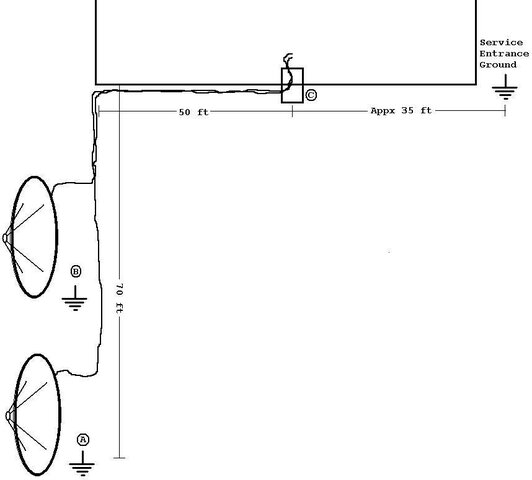Ok guys. I took ACRadio's advice and started this thread...
I know this has been beat into the ground (no pun intended) forever, but I would like opinions and experiences here to settle this...
I'm attaching a diagram of what I have.
Both dishes are aluminum mesh - 10 ft and 8 ft.
I have 8 ft ground rods at points A, B and, of course, at the service entrance.
Cabling is completely in PVC conduit between the sats and the house entrance.
As best as I can tell, per code, points A & B MUST be bonded via #6 copper back to the service ground.
I have no issue with that as I can run the #6 underground, no problem.
BUT... where should the coax, etc. tie to ground?
Should I do that at the dish or at point C where it enters the house?
If I have to do this at the house entrance, then I'll have to break out of the conduit to attach the grounding blocks. PLUS, best I can figure, I'll have to bond a 3rd ground at this point as I will be over the 20' limit to ground back to the service entrance (there is nothing else to ground to here)...
I'm sure this is a pretty typical scenario and surely there's others out there just like it.
Thanks all...
I know this has been beat into the ground (no pun intended) forever, but I would like opinions and experiences here to settle this...
I'm attaching a diagram of what I have.
Both dishes are aluminum mesh - 10 ft and 8 ft.
I have 8 ft ground rods at points A, B and, of course, at the service entrance.
Cabling is completely in PVC conduit between the sats and the house entrance.
As best as I can tell, per code, points A & B MUST be bonded via #6 copper back to the service ground.
I have no issue with that as I can run the #6 underground, no problem.
BUT... where should the coax, etc. tie to ground?
Should I do that at the dish or at point C where it enters the house?
If I have to do this at the house entrance, then I'll have to break out of the conduit to attach the grounding blocks. PLUS, best I can figure, I'll have to bond a 3rd ground at this point as I will be over the 20' limit to ground back to the service entrance (there is nothing else to ground to here)...
I'm sure this is a pretty typical scenario and surely there's others out there just like it.
Thanks all...


